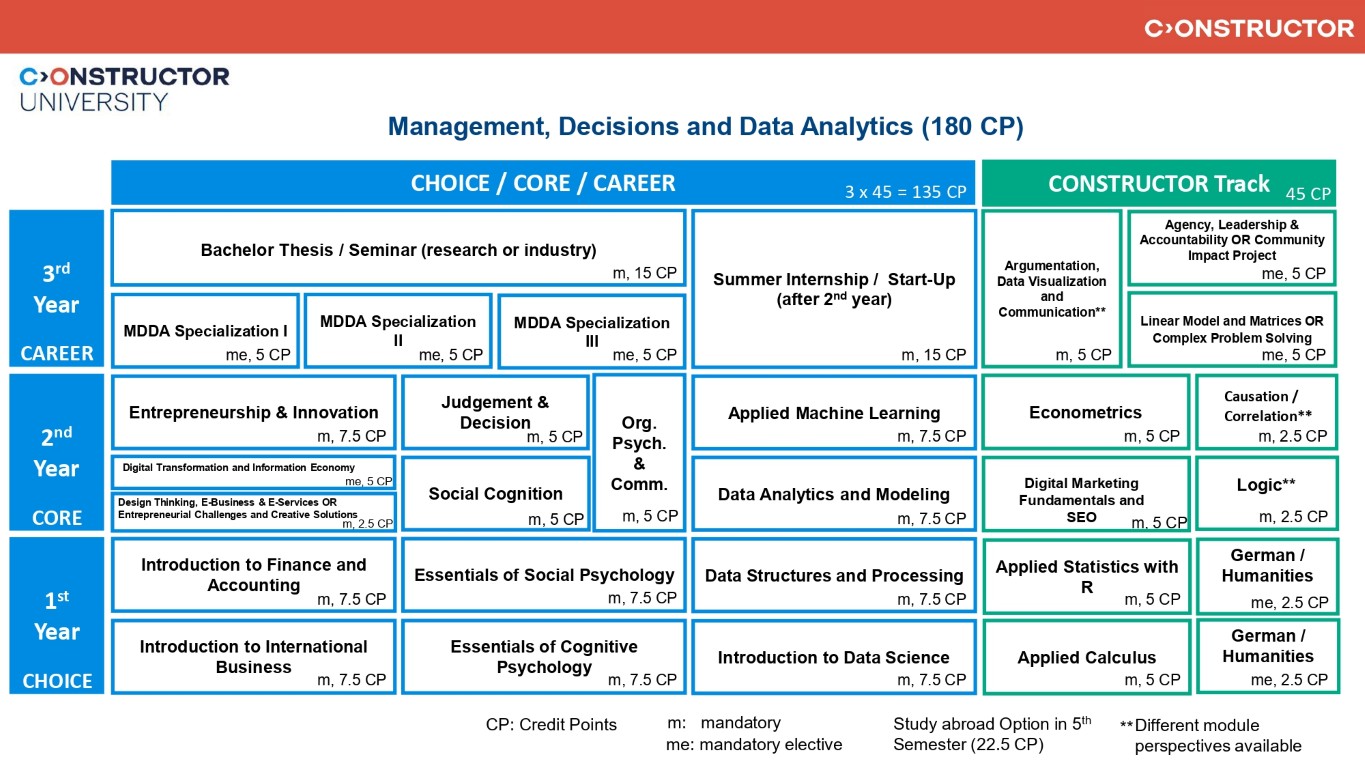The CONSTRUCTOR Track is another important feature of Constructor University’s educational model. The CONSTRUCTOR Track runs parallel to the disciplinary CHOICE, CORE, and CAREER modules across all study years and is an integral part of almost all undergraduate study programs. It reflects a university-wide commitment to help transform late-stage adolescents into confident, competent and responsible young adults by providing an intellectual tool kit to become life-long learners and by giving them the capacity to employ a range of methodologies to approach potential solutions to problems across disciplines. The CONSTRUCTOR Track contains Methods, New Skills and German Language / Humanities modules.
Methods Modules
Methods such as mathematics, statistics, programming, data handling, presentation skills, academic writing, and scientific and experimental skills are offered to all students as part of the Methods area in their curriculum.
The modules that are specifically assigned to each study program to equip students with transferable academic skills. They convey and practice specific methods that are indispensable for each students’ chosen study program. Students are required to take 20 CP in the Methods area. The size of all Methods modules is 5 CP.
To pursue BCCB as a major, the following mandatory Methods and Skills (15 CP) need to be taken:
- Methods Module: Mathematical Concepts for the Sciences (m, 5 CP, Semester 1)
- Methods Module: Physics for the Natural Sciences (m, 5 CP, Semester 2)
- Methods Module: Plant Metabolism and Natural Products (m, 5 CP, Semester 4)
For the remaining 5 CP BCCB students can choose between the two Methods modules
- Methods Module: Introduction to Bioinformatics (me, 5 CP, Semester 3)
- Methods Module: Analytical Methods (me, 5 CP, Semester 3)
New Skills Modules
This part of the curriculum constitutes an intellectual and conceptual tool kit that cultivates the capacity for a particular set of intellectual dispositions including curiosity, imagination, critical thought, and transferability. It nurtures a range of individual and societal capacities, such as self-reflection, argumentation and communication.
Finally, it introduces students to the normative aspects of inquiry and research, including the norms governing sourcing, sharing, withholding materials and research results as well as others governing the responsibilities of expertise as well as the professional point of view.
All students are required to take the following modules in their second year:
- New Skills Module: Logic (m, 2.5 CP)
- New Skills Module: Causation and Correlation (m, 2.5 CP)
These modules will be offered with two different perspectives of which the students can choose. The module perspectives are independent modules which examine the topic from different point of views. Please see the module description for more details.
In the third year, students take three 5 CP modules that build upon previous modules in the track and are partially constituted by modules that are more closely linked to each student’s disciplinary field of study. The following module is mandatory for all students:
- New Skills Module: Argumentation, Data Visualization and Communication (m, 5 CP)
This module will also be offered with two different perspectives of which the students can choose. In their fifth semester, students may choose between:
- New Skills Module: Linear Model/Matrices (me, 5 CP) and
- New Skills Module: Complex Problem Solving (me, 5 CP).
The sixth semester also contains the choice between two modules, namely:
- New Skills Module: Agency, Leadership, and Accountability (me, 5 CP) and
- New Skills Module: Community Impact Project (me, 5 CP).
Students who study abroad during the fifth semester and are not substituting the mandatory Argumentation, Data Visualization and Communication module, are required to take this module during their sixth semester. Students who remain on campus are free to take the Argumentation, Data Visualization, and Communication module in person in either the fifth or sixth semester as they prefer.
German Language and Humanities Modules
German language abilities foster students’ intercultural awareness and enhance their employability in their host country. They are also beneficial for securing mandatory internships (between the 2nd and 3rd year) in German companies and academic institutions.
Constructor University supports its students in acquiring basic as well as advanced German skills in the first year of the CONSTRUCTOR Track. Non-native speakers of German are encouraged to take two German modules (me, 2.5 CP each), but are not obliged to do so. Native speakers and other students not taking advantage of this offering take alternative modules in Humanities in each of the first two semesters:
- Humanities Module: Introduction to Philosophical Ethics (me, 2.5 CP)
- Humanities Module: Introduction to the Philosophy of Science (me, 2.5 CP)
- Humanities Module: Introduction to Visual Culture (me, 2.5 CP)












